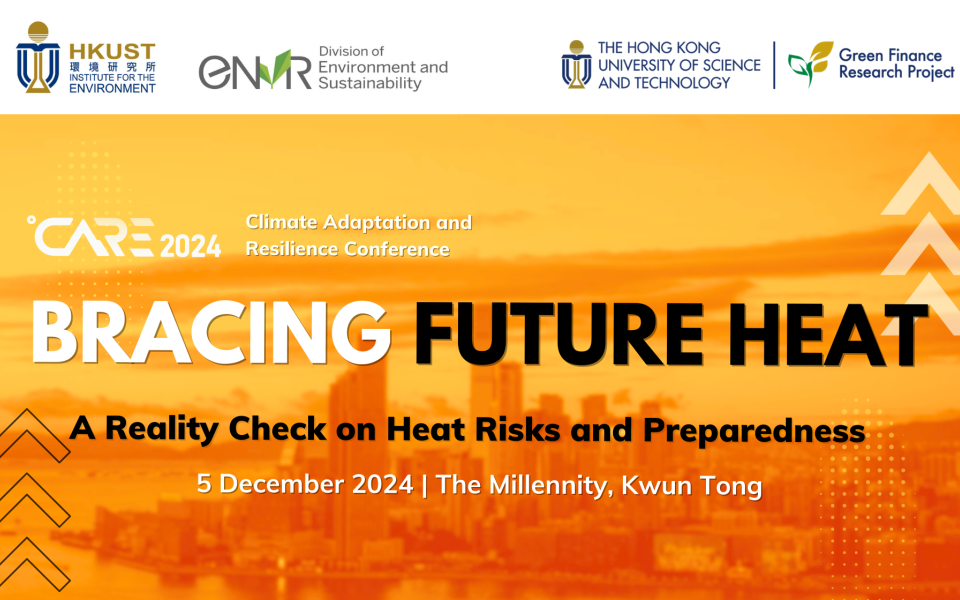This past summer, Hong Kong experienced unprecedented extreme heat, breaking historical records and underscoring the growing impact of climate change. What was once considered exceptional is increasingly likely to become the norm in the future. The impacts of such conditions on communities, the workforce, and vulnerable populations are becoming more severe. As temperatures continue to rise, the consequences for public health and occupational safety are intensifying across multiple sectors, highlighting the urgent need for effective responses.
As part of the Climate Adaptation and Resilience (CARE) workshop series, the Division of Environment and Sustainability and the Institute for the Environment at the Hong Kong University of Science and Technology organized this workshop to take stock of lessons learned from the summer of 2024. Building on the Surviving the Heat public forum in May, which aimed to raise awareness and alert stakeholders to the growing threat of extreme heat, this workshop focused on reviewing these challenges and identifying actionable strategies for resilience and preparedness.
The event brought together weather and climate experts, industry leaders, health professionals, NGOs, and community organisations supporting vulnerable groups to engage in meaningful dialogue and share insights on adapting to this pressing issue.
| Time | Program |
| 9:00 | Registration |
| 9:30 | Opening Remarks |
| 9:35 | Panel 1: Navigating the Science and Impacts of Extreme Heat |
|
Moderated by Prof. Alexis Lau, Head and Chair Professor, Division of Environment and Sustainability, HKUST
Panelists:
|
|
| 10:40 | Break |
| 10:50 |
Keynote Presentation - Heat stress and its impacts on human health and occupational work
|
| 11:10 | Panel 2: Rapid Responses for Extreme Heat Preparedness |
|
Moderated by Prof. Christine Loh, Chief Development Strategist, Institute for the Environment, HKUST
Panelists:
|
|
| 12:25 |
Closing Remarks
|
| 12:30 | Event Ends |
*Due to confidentiality requirements, some presentation slides have been omitted at the speakers' request.*
ATTENTION
Please note that the event will take place on the 30/F of The Millennity in Kwun Tong. Participants must obtain their entrance badges at the Concierge on the 10/F. To arrive on time, please allow an extra 10 minutes to reach the venue from the building entrance.
Be sure to pre-register through HERE to secure your seat and ensure your access to the venue.
(in alphabetical order by surname)

Prof. David Makram Bishai
Professor David Bishai is Clinical Professor in Public Health and Director of the School of Public Health, The University of Hong Kong. Prior to joining HKU, Professor Bishai had served as Professor at the Johns Hopkins Bloomberg School of Public Health for 27 years and served in the Maryland Department of Health as a local health officer in 2021.
A leading health economist, his research focuses on the performance and financing of global public health activities, primary healthcare, vaccines, and health disparities. He is the author of two books and more than 260 peer-reviewed scientific publications, His award-winning courses on systems thinking and health economics have reached over forty-thousand students. As President of the International Health Economics Association, he helped to establish a global mentoring network for early career researchers.
Professor Bishai maintains certification by both the American Board of Internal Medicine and the American Board of Pediatrics. He received his Bachelor of Arts from Harvard in Philosophy and Physics, his Masters in Public Health from the University of California at Los Angeles, his Medical Doctorate from the University of California at San Diego, and his Doctor of Philosophy from the Wharton Business School at the University of Pennsylvania.
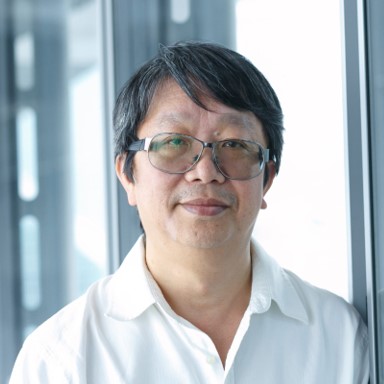
Prof. Alexis Lau
Prof. Alexis Lau, JP, is Head and Chair Professor of Division of Environment and Sustainability, Chair Professor of Department of Civil and Environmental Engineering, and Director of the Institute for the Environment at Hong Kong University of Science and Technology.
Prof. Lau specializes in air quality and health exposure, weather and climate, and environmental policies, with recent focuses on climate adaptation and resilience, as well as shaping the transition to green finance based on climate science. His professional techniques include the analysis of large-scale geophysical datasets, numerical models, and in-situ and satellite remote sensing.
Prof. Lau is a fellow of the Hong Kong Meteorological Society, a founding member of the Hong Kong Climate Change Forum, a scientific advisor to the Hong Kong Observatory, as well as a founding board member and chair of the Qualification Panel of the Hong Kong Institute of Qualified Environmental Professionals. Currently, Prof. Lau is leading the first pan-Pearl River Delta Air Quality study managed jointly by the regional governments under the “Cooperation Agreement on Regional Air Pollution Control and Prevention among Hong Kong, Guangdong, and Macao”. Additionally, he is a member of the Scientific Advisory Group of the World Health Organization Panel on the development of a Global Platform on Air Quality and Health.
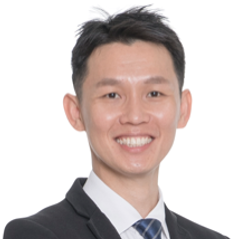
Prof. Jason Lee
Jason Lee is an Associate Professor at the Yong Loo Lin School of Medicine, National University of Singapore. He directs the Heat Resilience and Performance Centre. Jason completed his 12-year tenure at the DSO National Laboratories in 2018 by directing the Human Performance Programme in his final appointment. He is a Fellow of the American College of Sports Medicine since 2012. Jason chaired the Scientific Committee on Thermal Factors at the International Commission on Occupational Health and currently co-chairs the Heat Injury Clinical Practice Guidelines at the Ministry of Health in Singapore. He is on the management committee at the Global Heat Health Information Network and leads the WHO-WMO GHHIN Southeast Asia Heat Health Hub to scale up efforts in managing the complex health risks posed by rising ambient temperatures.
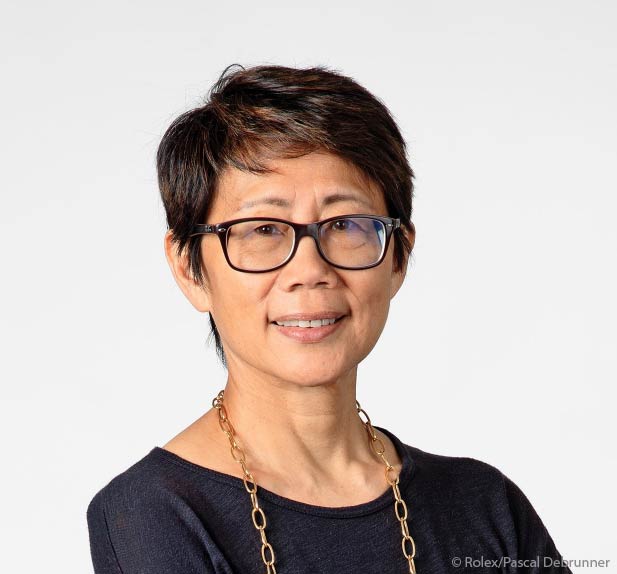
Prof. Christine Loh
Prof. Christine Loh is the Chief Development Strategist at the Institute for the Environment, Hong Kong University of Science and Technology (HKUST). Previously, she held the positions of Special Consultant to the Office of the Chief Executive of the HKSAR Government on the ecological civilization aspects of the Greater Bay Area Outline Development Plan (2019-2020); and Under Secretary for the Environment in the HKSAR Government (2012-2017). She was the CEO of Civic Exchange, an independent non-profit public policy think tank (2000-2012). Before that, Prof. Loh served as a member of the Hong Kong Legislative Council, first appointed in 1992 and later elected in 1995 and 1998. Earlier, she spent 14 years in the private commercial sector in commodities trading. Currently, she is a board member of Global Maritime Forum, New Forests Pty Ltd, Towngas Smart Energy Company Limited, and is Asia Society’s Scholar in Residence. She is also a Steering Committee member of the United Nations International Organization for Migration’s new Climate Mobility Innovation Lab.

Chi-ming Shun
Mr. Shun Chi-ming graduated from the University of Hong Kong in Bachelor of Science, with major in Physics. He joined the Hong Kong Observatory in 1986. He received post-graduate training in radiological protection and meteorology in the United Kingdom in 1987-88. Mr Shun specialized in aeronautical meteorology since the 1990s and led the development of the world-first LIDAR Windshear Alerting System for the Hong Kong International Airport. Mr Shun was promoted to Director of the Hong Kong Observatory in 2011 and retired in 2020.
In the international arena, Mr. Shun was President of the Commission for Aeronautical Meteorology of the UN World Meteorological Organization during 2010-2018, the first Asian elected to take up this high international position. He was also the Vice-Chairman of the Asia/Pacific Communications, Navigation and Surveillance / Meteorology Sub-Group, in charge of Meteorology, of the UN International Civil Aviation Organization during 2003-2009.
After retirement, Mr. Shun has been active in popularization of science and meteorology, as a writer of books, columnist on climate change, and speaker for schools and professional bodies. He also co-organized HKUST’s Climate Adaptation and Resilience Conference (CARE2022). In May 2023, Mr Shun was appointed member of the Council for Carbon Neutrality and Sustainable Development.
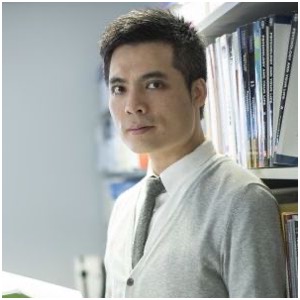
Prof. Kim-Pong Tam
Deeply concerned about the health of both the planet and its inhabitants, Kim-Pong Tam redirected his research focus in the early 2010s to concentrate entirely on environmental issues and human behavior. Since then, he has developed an extensive body of research exploring the psychological aspects of human-nature and human-environment relationships. Recently, he has expanded his interests to include human responses to climate change. His work has been published in prestigious journals such as Global Environmental Change, Climatic Change, and the Journal of Environmental Psychology. He has also served in various editorial roles for a number of environmental and psychological journals. He regularly teaches environmental psychology and the psychology of climate change in Hong Kong and Japan. Additionally, he actively collaborates with and provides consulting services to local and international environmental organizations.
Jim Taylor
Jim has been with China Light & Power in Hong Kong since 2001, after moving from Melbourne, Australia. Jim is Senior Advisor at CLP Power Hong Kong, where he is responsible for supporting the company's future long term strategic development and regulatory regime. Jim has extensive senior management experience of electricity, gas and environmental issues with leading companies in both regulated and deregulated energy markets in the UK and Australia.
Prior to his current role in CLP, Jim has been responsible for the company's long term strategic planning, developing the decarbonisation approach for the Hong Kong business and the interface with the Government for the operation of the Scheme of Control, with earlier appointments covering retail strategy, CLP’s largest customers, energy efficiency & conservation and tariff design.
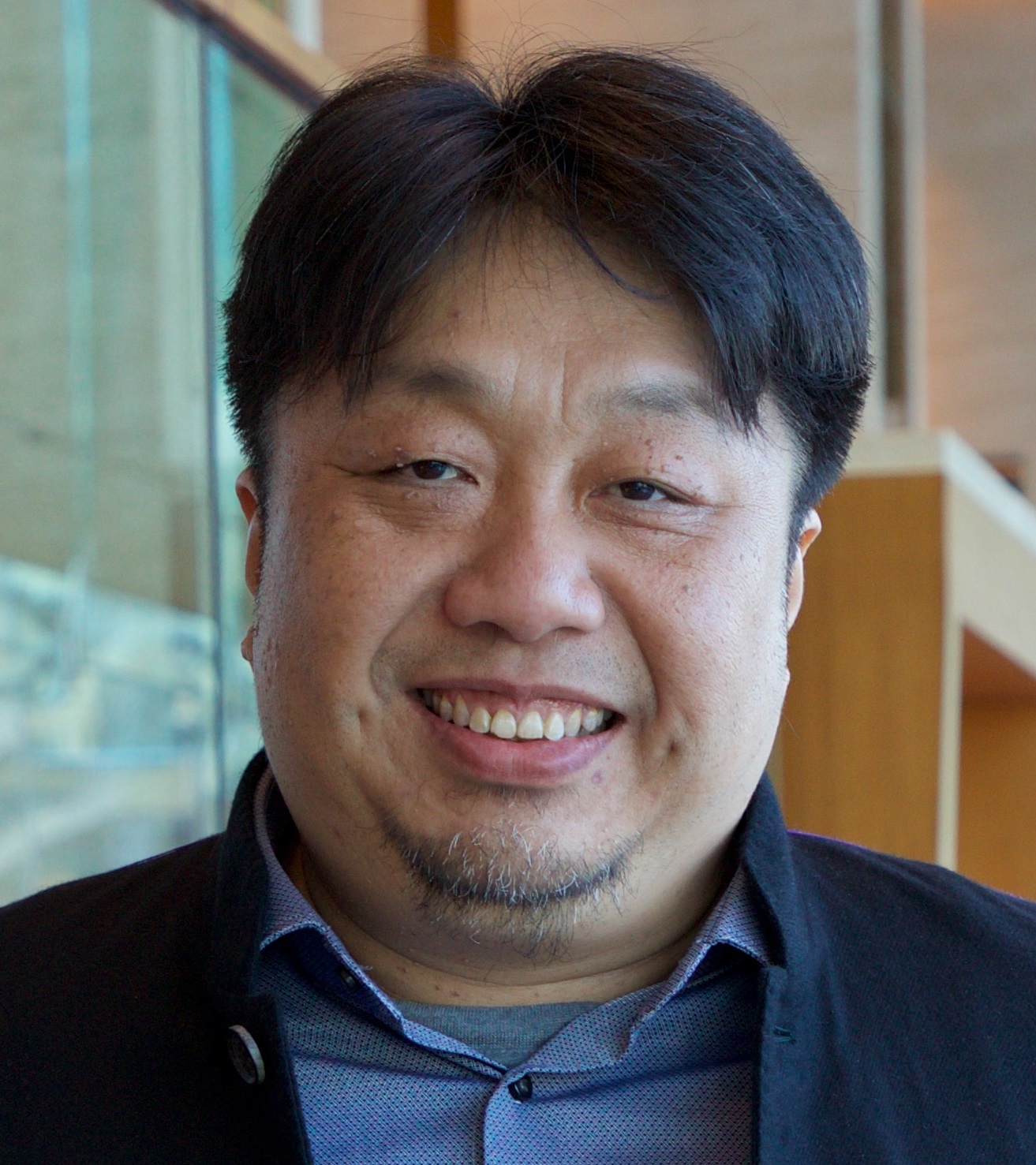
Eddie Tse
Eddie has more than 27 years experience in construction and environmental field and specializes in sediment and land contamination assessment and remediation, carbon/energy management, renewable energy projects and waste/asbestos management. In Gammon, He has been involved in a number of infrastructure and building projects such as road and drainage, site formation and land decontamination, railway, power plant emission control facility, tunnel and rock cavern and Central Government Complex.
Eddie is the vice chairman of Environment Committee, Hong Kong Construction Association and member of Climate Change Business Forum of the Business Environment Council. He is a co-opted member of the Sustainable Development Committee, Climate Change Framework for Built Environment Embodied Carbon Expert Group member and Green Product Market Taskforce member of the Hong Kong Green Building Council. He is also a member of Asbestos Administration Committee of the Environmental Protection Department.
Eddie graduated in Chemical Engineering from the University of British Columbia in Canada, and has a Master of Science (Major in Environmental Engineering) degree from The Hong Kong Polytechnic University. Eddie is a Fellow member of the Hong Kong Institute of Qualified Environmental Professionals and Certified Carbon Auditor under the Construction Industry Council Green Product Certification Scheme.
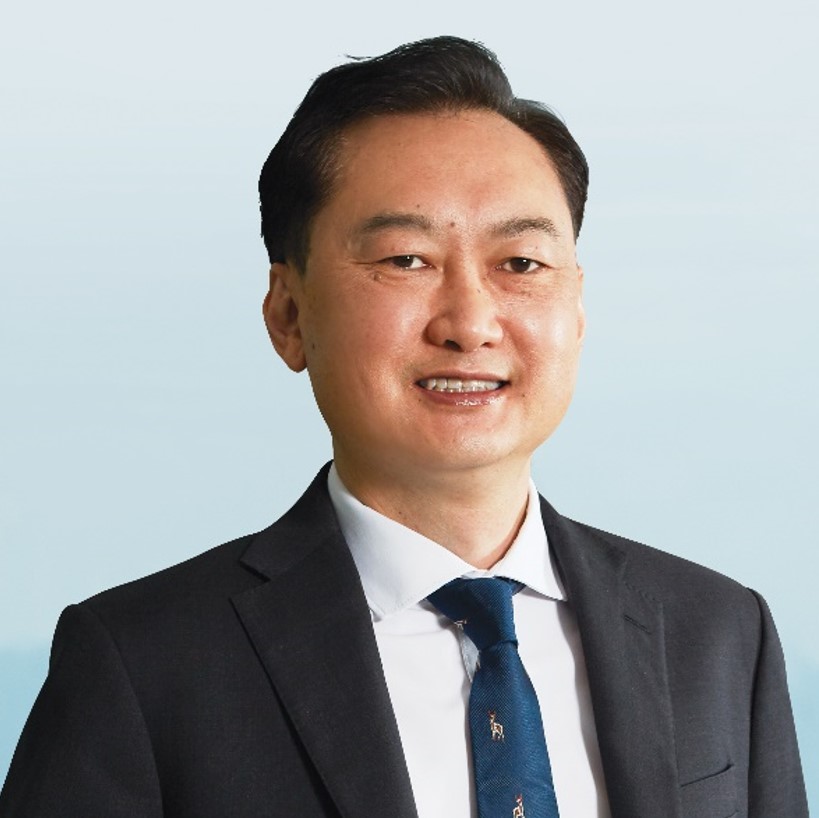
Clarence Wong
Mr. Clarence Wong is the Chief Economist of Peak Re. Mr. Wong is responsible for delivering strategic insights on economic, insurance and emerging risks to the company and its key stakeholders. He also oversees the development of thought-leadership content for Peak Re.
Mr. Wong is an industry veteran with more than 30 years of experience in the finance industry and an extensive research track record.
Before joining Peak Re, Mr. Wong worked at Swiss Re since 1999, where he last served as the Chief Economist, Asia. He led a team of researchers to provide Swiss Re and other stakeholders with economic and insurance insights, as well as research on emerging risk landscape in Asia. At the same time, his team contributed to Swiss Re’s sigma, the regular insurance industry report that is considered a “must-read” for anyone interested in the sector.
Prior to that, Mr. Wong spent nine years at HSBC’s economic research department, worked at PricewaterhouseCoopers in its management consulting arm, and in the R&D department of Hutchison Trading Ltd.
Mr. Wong has a Master’s degree in Economics from the University of Hong Kong.
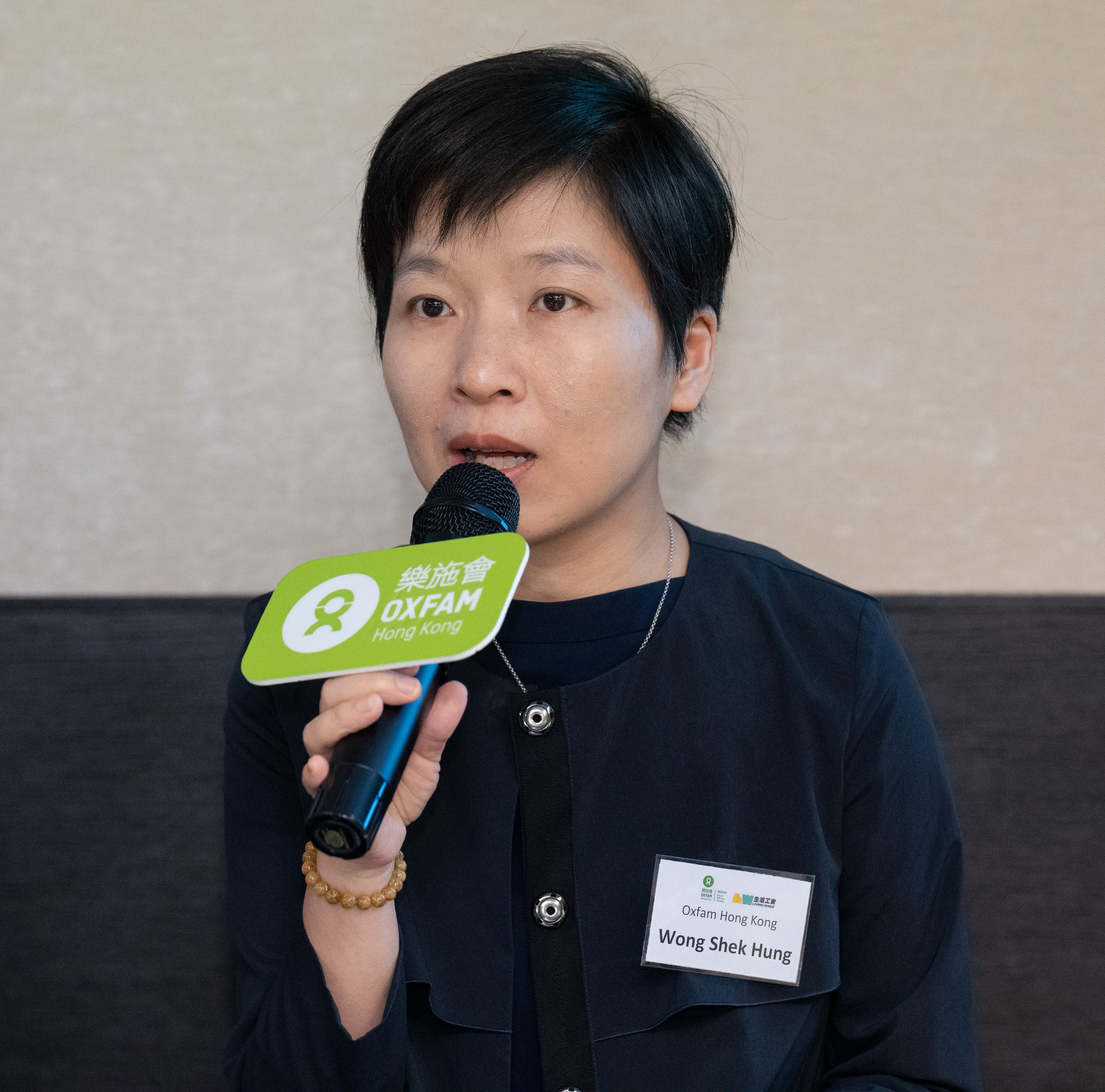
Wong Shek Hung
Ms. Wong Shek Hung is the Director of the Hong Kong, Macau, Taiwan Programme at Oxfam Hong Kong. In this role, she is primarily responsible for grant management, research advocacy, campaigns, social incubation, development education, and humanitarian work addressing both local and global poverty issues.
Over the past few years, Ms. Wong has led her team to achieve significant pro-poor policy changes, including the establishment of Hong Kong's first poverty line, the introduction of new subsidy schemes for low-income families, and initiatives promoting a living wage. She also spearheaded the first Pay-for-Success project (known as a Social Impact Bond) for a Chinese language education program aimed at ethnic minority children in Hong Kong. Her team plays a crucial role in incubating and nurturing innovative community development projects, policy advocacy, and new social enterprises focused on poverty alleviation in the region. Additionally, she has led efforts to advance climate resilience and mitigation campaigns in Hong Kong and Macau, leveraging technology and social innovation.
Before joining Oxfam, Ms. Wong worked as a social worker for over a decade, advocating for the rights of various disadvantaged groups, including residents of cage homes, individuals affected by urban renewal, low-income families, ethnic minorities, and children. She has also served as a lecturer at several universities, teaching social work.
Ms. Wong holds a Master of Philosophy degree from the Hong Kong Polytechnic University and a Bachelor of Social Work degree from the City University of Hong Kong. She is a registered social worker and currently serves as an Advisory Board Member of the Doctor of Policy Studies Advisory Board at Lingnan University, Hong Kong.

Eva Yeung
Ms. Eva Yeung is a Senior Manager of Community Resilience Service at the Hong Kong Red Cross. She is passionate about promoting participatory approach and community resilience agenda. She has been actively involved in humanitarian development with international NGOs, including disaster relief and disaster risk reduction both locally and internationally.
Eva is the Chairperson of the IFRC Asia Pacific Community Resilience Community of Practice, Vice-Chair of the IFRC Disaster Risk Reduction Working Group, and the Core Group Member of the Asia Pacific Urban Community Resilience Hub, focusing on research and development relating to community resilience, urban development, disaster risk reduction and climate change adaptation.
